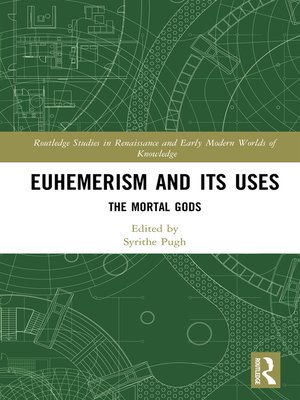Euhemerism and Its Uses
ebook ∣ The Mortal Gods · Routledge Studies in Renaissance and Early Modern Worlds of Knowledge
By Syrithe Pugh

Sign up to save your library
With an OverDrive account, you can save your favorite libraries for at-a-glance information about availability. Find out more about OverDrive accounts.
Find this title in Libby, the library reading app by OverDrive.



Search for a digital library with this title
Title found at these libraries:
| Library Name | Distance |
|---|---|
| Loading... |
Euhemerism and Its Uses offers the first interdisciplinary, focussed, and all-round view of the long history of an important but understudied phenomenon in European intellectual and cultural history.
Euhemerism – the claim that the Greek gods were historically mortal men and women – originated in the early third century BCE, in an enigmatic and now fragmentary text by the otherwise unknown author, Euhemeros. This work, the Sacred Inscription, has been read variously as a theory of religion, an atheist's manifesto, as justifying or satirizing ruler-worship, as a fantasy travel-narrative, and as an early 'utopia'. Influencing Hellenistic and Roman literature and religious and political thought, and appropriated by early Christians to debunk polytheism while simultaneously justifying the continued study of classical literature, euhemerism was widespread in the middle ages and Renaissance, and its reverberations continue to be felt in modern myth-theory. Yet, though frequently invoked as a powerful and pervasive tradition across several disciplines, it is still under-examined and poorly understood.
Filling an important gap in the history of ideas, this volume will appeal to scholars and students of classical reception, mediaeval and Renaissance literature, historiography, and theories of myth and religion.







